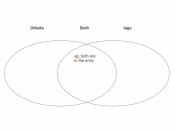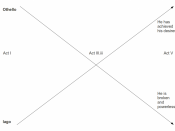The form and features used in the play 'Othello' by Shakespeare and the painting 'jealousy' by Edvard Munch thoroughly convey the composer's ideas of jealousy and manipulation. Although composers deliberately position the audience to accept their meanings, the interpretation of these meanings can be wavered given the viewer's current context.
Shakespeare's context differs greatly to our current perspective, more specifically, the view of women, social identity and religion. In his work 'Othello' we are shown the way that jealousy can manifest itself to supersede reason and logic .Shakespeare proves that jealousy is inherently unreasonable, as it is founded on the psychological issues of the jealous person, not on the behaviour of the one who prompts the jealous feelings. Othello is Shakespeare's best example of jealousy; noble, famous, and highly placed in the regard of others, Othello has everything. His weakness is a pervading insecurity and self-loathing, which provides fertile ground for Iago to capitalize on Othello's fatal flaw; an unreasonable, irrational jealousy that drives him to kill.
As early as the first Act, Iago also expresses an irremovable jealousy of Othello, whom he suspects "that twixt my sheets/H'as done my office (1.3.367-368)" Iago sets the tone for the irrational effect jealously has on the play's characters. Even though Iago is not certain that Othello is guilty of 'cuckolding' him, his suspicion "Will do as if for surety (1.3.371)" 'Othello', may be an example of how pure faith and acceptance can be more important than adulterated free will. Whether they are more important or whether free will exists at all, in my opinion, comprise unanswered questions of both Shakespeare's Othello as well as the human condition. In the final act Othello strangles Desdemona, though she has been perfectly faithful, given today's context this ending leads many to wonder why Othello was...


